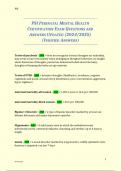PSI
PSI PERINATAL MENTAL HEALTH
CERTIFICATION EXAM QUESTIONS AND
ANSWERS UPDATED (2024/2025)
(VERIFIED ANSWERS)
Traits of psychosis - ANS ✓does not recognize actions/thoughts are unhealthy,
may seem to have less anxiety when indulging in thoughts/behaviors, no insight
about distortion of thoughts, parent has delusional beliefs about the baby,
thoughts of harming the baby are ego-syntonic
Traits of PTSD - ANS ✓intrusive thoughts (flashbacks), avoidance, negative
cognitions and mood, arousal (sleep disturbance, poor concentration, aggression,
hyper vigilance)
maternal mortality-all women - ANS ✓1,200 a year or 14.4 per 100,000
maternal mortality-black women - ANS ✓43.5 per 100,000
Bipolar 1 Disorder - ANS ✓a type of bipolar disorder marked by at least one
lifetime full manic and major depressive episodes
Hypomania - ANS ✓A mild manic state in which the individual seems
infectiously merry, extremely talkative, charming, and tireless. up to 4 days in
length
mania - ANS ✓a mood disorder marked by a hyperactive, wildly optimistic state-
function is impaired. can last 7 days
1
PSI Perinatal
,PSI
prevalence of first diagnosis of bipolar disorder postpartum - ANS ✓50%
Risk factors for postpartum psychosis - ANS ✓History of bipolar or psychotic
disorder, first pregnancy, family history, recent discontinuation of psychotropic
medication
Postpartum psychosis symptoms - ANS ✓onset-2 weeks postpartum, poor
concentration, disorientation, agitation, aloof, lack of self care, elated/labile
mood, rambling speech, thought broadcasting/delusion of grandiosity,
disorganized thoughts, flight of ideas, hallucinations
reducing risk of postpartum psychosis - ANS ✓stay on bipolar medication,
treat immediately in women with history of psychosis and bipolar, good sleep is
essential
Evidence based risk factors for PMADS - ANS ✓previous PMADS (family
history, personal history, symptoms during pregnancy), history of mood/anxiety
disorders (personal or family history of depression, anxiety, OCD, eating
disorders, bipolar disorders), significant mood reactions of hormonal changes
(puberty, PMS, hormonal birth control)
More evidence based risk factors for PMADS - ANS ✓endocrine dysfunction
(diabetes, thyroid imbalance, fertility challenges), social factors (IPV, low
support, financial stress, racism), high stress parenting (military families,
adolescent parents, parents of multiples, single parents)
Exacerbating factors of postpartum depression - ANS ✓pain, lack of sleep,
abrupt discontinuing of breast feeding, childcare stress, relationship stress,
losses, history of childhood sexual abuse, complicated pregnancy, health changes
in baby or parents, temperament of baby, climate stressors: seasonal depression
or mania, perfectionism/high expectations, unresolved grief or attachment with
mother, returning to work
Substance Use in Pregnancy - ANS ✓5.4% all women use illicit drugs during
pregnancy, 14.6% of adolescent moms
2
PSI Perinatal
, PSI
Alcohol use in pregnancy - ANS ✓8.5% of women drank within last month,
most during first trimester (17.9%)
Postpartum substance abuse - ANS ✓40-49% report alcohol use, 4.5-8.5%
report marijuana use
Risks for single parents - ANS ✓twice as likely to report depressive and
anxious symptoms over partnered parents.
NICU rates - ANS ✓10-15% of babies spend time in the NICU
NICU parents often traumatized
high rate of anxiety and depression
Maternal psychological impact of neonate - ANS ✓parents: difficulty bonding,
poor attunement, smile less, less eye contact, avoid physical contact, less
verbalization
the depressive dyad - ANS ✓when mom is depressed, babies are more often:
delayed in speech and cog development, short attention span, sleep problems,
feeding issues, increased frequency of GI upset, prone to colic, excessive crying,
irritability.
NICU family prevalence of PMADS - ANS ✓20-30% of diagnosable mental
health disorder. more experience PTSD
NICU moms rate of depression - ANS ✓up to 63%
NICU moms rate of anxiety - ANS ✓up to 27%
NICU moms rate of PTSD - ANS ✓53%
3
PSI Perinatal




